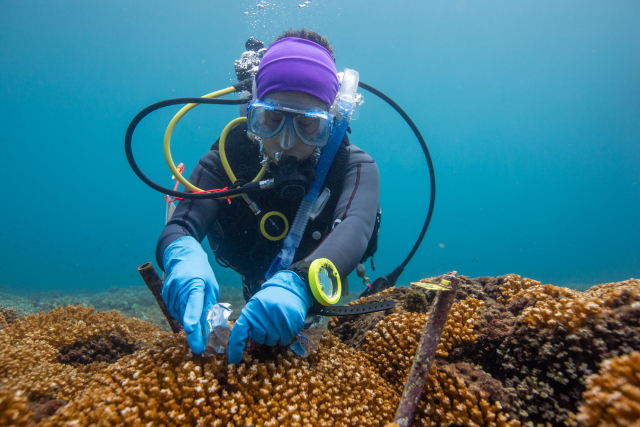12/07/2023 | To find tangible solutions for ocean protection, we should listen to the people most affected by current ocean problems: people in the tropics. So say 25 authors of a commentary published in the journal Ocean Sustainability and initiated by the Smithsonian Tropical Research Institute (STRI) in Panama. Estradivari, an Indonesian marine scientist at the Leibniz Centre for Tropical Marine Research (ZMT) in Bremen, Germany, also contributed to the publication.
The authors come from all regions of the tropics and represent a wide range of disciplines. In the publication, they discuss how to address the most pressing problems facing the oceans, particularly in the global tropics. The focus on the tropics stemmed from the Our Ocean Conference, held in Panama in March 2023. However, rather than focusing exclusively on practical aspects of ocean conservation, the article addresses more fundamental issues such as making ocean policy and science more equitable and effective.
To create solutions to ocean problems, the authors argue that four key actions need to be taken first, based on perspectives, experiences, and knowledge from the tropics. These include equity in ocean research and governance, reconnecting people and the ocean, redefining ocean literacy, and decolonizing ocean research. These actions, they say, are critical to ensuring tropical populations play a leading role in sustaining prosperous coastal communities and healthy marine ecosystems.
“The underlying tone is that systemic changes in inequity and access are important,” says lead author Ana Spalding of the STRI. “We still incorporated the more technical science side of things, but that’s been written, that’s been talked about.”
“The paper really highlights that the problem isn’t just with the changes to natural ecosystems, fish and mangroves, the problem is the disproportionate impact that those changes have on certain groups of people, particularly around the global tropics. And we’re not going to see changes in nature until we see systemic changes in how people in these regions can participate, engage, feel connected to the issues, and feel responsible for these changes,” stated Spalding.
As the authors point out, the tropics harbour most of the world's marine biodiversity. Most people who depend directly on the ocean live in tropical regions. Yet, the ocean management agenda is largely set on the basis of scientific evidence, funding, and institutions from high-income temperate countries. Policy decisions are disproportionately made by decision-makers outside tropical regions, whose interests consciously or unconsciously drive the conversation.
"These externally driven approaches undermine the equity and effectiveness of current solutions and hinder the self-responsibility and potential future leadership of the tropics, which are well positioned to develop evidence-based solutions for ocean conservation and sustainable use," said co-author Estradivari of ZMT.
“Amplifying the voice of the tropical majority in ocean science and governance is key to making sure decisions related to the tropics include perspectives from key actors from the tropics,” says co-author Josheena Naggea of Stanford University in the United States.
“Current scientific leaders need to realize that scientists in the tropics have been mostly ignored or marginalized for a very long time and we nevertheless are producing essential knowledge, and often in much more equitable ways,” adds co-author Andrés Cisneros-Montemayor, deputy director of Ocean Nexus and assistant professor at Simon Fraser University in Canada.
The ZMT underlines the importance of such thinking. Since its founding in 1991, the institute has pursued the approach of "eye-to-eye" partnerships in the tropics, anchored in the Bremen Criteria. "Both the new treaty on international marine conservation and the perspective of a "blue economy" require research on indigenous and local knowledge, solidarity and fairness. This is not an ornamental accessory, but an integral part of the work at the ZMT," says the scientific director of the ZMT, Prof. Dr. Raimund Bleischwitz.
Publication
Spalding, A. K., Grorud-Colvert, K., Allison, E., Amon, D. J., Collin, R., de Vos, A., Friedlander, A. M., Johnson, S. M., Mayorga, J., Paris, C. B., Scott, C., Suman, D. O., Cisneros-Montemayor, A. M., Estradivari, Giron-Nava, A., Gurney, G. G., Harris, J. M., Hicks, C., Mangubhai, S., Micheli, F., Naggea, J., Obura, D., Palacios-Abrantes, J., Pouponneau, A., Vega Thurber, R. (2023). Engaging the Tropical Majority to Make Ocean Governance and Science more Equitable and Effective. Ocean Sustainability. https://www.nature.com/articles/s44183-023-00015-9





